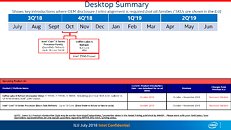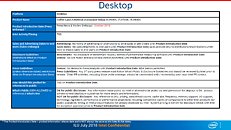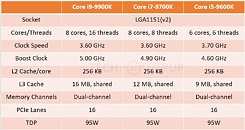Friday, August 3rd 2018

Intel to Paper-launch 9th Gen Core on August 14, Availability in Q4-2018
Intel's client desktop processor lineup is under tremendous pressure owing to competition from AMD, with the company having to roll out entire processor generations over mere 2-3 quarters. You'll recount that Intel was merrily trotting around with its barely-innovative 7th Gen "Kaby Lake" family in early 2017, when AMD stunned the industry with an outperforming product lineup. The 7th generation barely lasted its planned product cycle, before Intel rushed in a pathetic sub-$500 Core X lineup, and the 8th generation "Coffee Lake" with 50-100% core-count increases. Even that is proving insufficient in the wake of 2nd generation AMD Ryzen "Pinnacle Ridge," and Intel is cutting short its product cycle with the 9th generation Core "Whiskey Lake" (or "Coffee Lake" Refresh) series, that further increase core-counts.
"Whiskey Lake" was originally planned for Q1-2019 alongside the 14 nm original Z390 chipset. Intel wasn't expecting AMD to rebound with Ryzen 2000 series (particularly the tangible IPC increases and improved multi-core boosting). And so, it decided to rush through with a new product generation yet again. The Z370 is being re-branded to Z390 (with an improved CPU VRM reference design), and what was originally meant to come out in Q1-2019, could come out by Q4-2018, at the very earliest by October. Intel reportedly planned availability sooner, but realized that distributors have heaps of unsold 8th generation Core inventory, and motherboard vendors aren't fully ready for the chip. Since getting a 9th gen Core chip doesn't warrant a new motherboard, customers would be inclined to pick up 9th generation chip with their existing boards, or any new 300-series board. This would kill the prospects of selling 8th generation Core CPUs.Intel still wants to make the presence of its 9th generation Core processors felt. And so, at the risk of cannibalizing its 8th generation Core sales, Intel is going ahead with a paper-launch of 9th generation Core on 14th August. You'll have to wait until October not just for availability, but also reviews of these chips. The company is just looking to restore competitiveness at the upper end of its lineup for now, and so its launch will be limited to three SKUs: Core i9-9900K, Core i7-9700K, and Core i5-9600K (detailed in the table below). Of these, the i9-9900K and the i7-9700K are the first 8-core processors by Intel on the mainstream-desktop platform; while the i5-9600K is a 6-core chip that's largely unchanged from the current-generation Core i5 chips. This shows that Intel won't improve its lineup over generation unless absolutely warranted by the competitive environment.
Source:
HKEPC
"Whiskey Lake" was originally planned for Q1-2019 alongside the 14 nm original Z390 chipset. Intel wasn't expecting AMD to rebound with Ryzen 2000 series (particularly the tangible IPC increases and improved multi-core boosting). And so, it decided to rush through with a new product generation yet again. The Z370 is being re-branded to Z390 (with an improved CPU VRM reference design), and what was originally meant to come out in Q1-2019, could come out by Q4-2018, at the very earliest by October. Intel reportedly planned availability sooner, but realized that distributors have heaps of unsold 8th generation Core inventory, and motherboard vendors aren't fully ready for the chip. Since getting a 9th gen Core chip doesn't warrant a new motherboard, customers would be inclined to pick up 9th generation chip with their existing boards, or any new 300-series board. This would kill the prospects of selling 8th generation Core CPUs.Intel still wants to make the presence of its 9th generation Core processors felt. And so, at the risk of cannibalizing its 8th generation Core sales, Intel is going ahead with a paper-launch of 9th generation Core on 14th August. You'll have to wait until October not just for availability, but also reviews of these chips. The company is just looking to restore competitiveness at the upper end of its lineup for now, and so its launch will be limited to three SKUs: Core i9-9900K, Core i7-9700K, and Core i5-9600K (detailed in the table below). Of these, the i9-9900K and the i7-9700K are the first 8-core processors by Intel on the mainstream-desktop platform; while the i5-9600K is a 6-core chip that's largely unchanged from the current-generation Core i5 chips. This shows that Intel won't improve its lineup over generation unless absolutely warranted by the competitive environment.



105 Comments on Intel to Paper-launch 9th Gen Core on August 14, Availability in Q4-2018
On that note though, it's not like the past 10 years were particularly bad for computing. Or am I missing something? Sure, they needed competition, but it's not like my computing and gaming life was worse during that time.
Competition drives price down and performance up, as you see is happening here.
If there were more competition in the market in the pass years, 4k and VR Gaming should have been a common place.
Instead what we got was people saying 4k and more than dual / quad core are never needed, because they were priced so high and impractical for most people.
Just look at 2 years ago when a good 8-core CPU cost $1100, that being the 6900K.
Today with Ryzen you can find one on sale for $200, and offer similar performance.
Oh and 4k TVs and display are quite easy to find today.
In the case of CPUs, faster cpus do allow better AI and more NPCs etc interacting on screen, so it still helps the gaming experience.
Also I forgot to mention that Larrabee was also a fail attempt to make a GPU and some of that tech ended up as Xeon Phi.
Even Larrabee wasn't their first deciated graphics card either, I forgot the name of the much older one that they actually released.
Worth mentioning G5400 for 60 bucks.
Amd has good chips too, but people tend to forget the Intel lower end/mid end offer and only focus on the super expensive i7 x700k and its awful paste on the die.
According to HKEPC, the Intel document said that a more precise release date will be provided on 14th August.
Is laughable really xD
I wouldn't consider these thoughts completely foolish. But at least for me there is some historical precedent for my skepticism of their actions.
www.intc.com/investor-relations/investor-education-and-news/investor-news/press-release-details/2018/Intel-Reports-Second-Quarter-2018-Financial-Results/
ir.amd.com/news-releases/news-release-details/amd-reports-second-quarter-2018-financial-results
But when you don't OC there is no reason to go for Intel. That's Intel advantage against Ryzen - the OC headroom that Ryzen lacks. Take that away and you get such a similar level of performance that most users won't notice the difference. Not sure what software incompabilities are you referring to. Thunderbolt is very niche. Not even most Intel's own products inclde integrated ports for it. Plus with USB 3.1 g2 TB's speed advantage in real world scenarios is debateable.
So in my optinion both have quirks you have to account for. Neither is a smooth experience in terms of OC or compability.